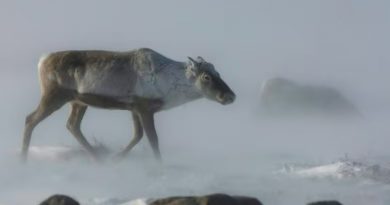Nunavut mine expansion won’t harm narwhals or seals, company says

Baffinland Iron Mines Corporation says its proposed expansion of the Mary River Mine on north Baffin Island won’t cause any lasting harm to marine mammals in the area, despite concerns from some Inuit and environmentalists.
And the company says an expected $2 billion in benefits and royalties for Inuit communities over the mine’s lifespan is not meant to be compensation for loss of land use or wildlife.
“There is no expectation from Baffinland to lose narwhals or seals. If that’s what would happen then we shouldn’t be doing it,” said Udlu Hanson, Baffinland vice president of community development, at a hearing on Saturday.
Hanson says she hopes communities do see changes because of the mine, but changes for the better — greater food security, less crowded housing, and lower rates of unemployment experienced in Nunavut.
“We should ask, should change be avoided?” she said.
Hanson’s statement came in response to a question from the Mittimatalik Hunters and Trappers Organization (MHTO) during day six of an ongoing environmental hearing being run by the Nunavut Impact Review Board over a proposed expansion at the Mary River Mine on north Baffin Island.
Vice chairperson for the MHTO in Pond Inlet, Enookie Inuarak, said the community is not against mining, and it values jobs created by Baffinland’s existing operation that sees six million tonnes of iron ore shipped from Milne Inlet each year.
But he asked Baffinland whether the financial benefits were worth losing a community’s heritage and food source.
The MHTO says it has a duty under the Nunavut Agreement to speak up for the constitutionally protected hunting rights of Inuit.

Mine says impacts to narwhal won’t cause permanent harm
The concern from many Nunavummiut is that doubling production at the mine by 2024 — through constructing a railway and increasing shipping — will decrease the health and hunting stocks of narwhal that rely on the waters of Eclipse Sound during the summer. There are also concerns about potential impacts on seals.
Baffinland says its planned expansion will have an impact on marine life, but won’t cause permanent damage.
“Our assessment has been transparent in that narwhal and other marine mammals will be disturbed by shipping noise, but these effects are anticipated to be short term, localized and reversible in nature,” said Baffinland’s marine specialist Phil Rouget on Friday at the hearing, during a presentation on impacts to the marine environment.
During the summer, when one or two ships could be travelling in and out of Milne Inlet each day (if the expansion is approved), Rouget says there are only a few hours when narwhal could be disturbed by ship noise.
Vessels travelling in and out of Milne Inlet go at a speed of nine knots, to avoid striking whales or seals, he said.
Rouget says Inuit have been directly involved in all marine monitoring and the mine’s wildlife analysis. He said half of Baffinland’s marine monitors are Inuit.
The mine says according to data from the Department of Fisheries and Oceans, there are more narwhals being hunted now than when production started in 2014. That’s except for in 2018, which was considered a low year for narwhal stocks.
Environmentalists disagree
Non-profit environmental groups taking part in the hearing disagree with Baffinland.
Shipping noise, especially noise from the larger vessels that a mine expansion would bring, can mask communication sounds narwhals, seals and bowhead whales use for finding food and socializing, says Chris Debicki, vice president of policy for Oceans North.
“In the last few years, the volume of ships passing through Milne Inlet and Eclipse Sound has increased dramatically,” he told CBC.
“We don’t yet understand the environmental consequences of the increase to the present levels, and so consideration of an additional doubling of ship volumes is grossly premature.”

Debicki said the discussion is not about stopping mining.
“This is a multigenerational resource, and if done right we’re talking about hundreds of years of economic development, so it is absolutely critical at this phase to get this right,” Debicki said.
The World Wildlife Fund (WWF) says a shipping increase planned for Mary River also means an increased likelihood of oil spills, in a region where emergency spill response times can range from a few days to a full week. WWF says at the rate of shipping proposed, there would be a one-in-three chance of a catastrophic oil spill happening over the lifespan of the mine.
“The costs are immeasurable,” Andrew Dumbrille, shipping specialist for WWF, told CBC.
“It could be the complete destruction of the narwhal harvest for many years — 20 or 30 years. It would completely destroy the marine habitat for Pond Inlet and communities in that area.”
The group is urging the mine to switch its fuel source to marine diesel or gasoline, instead of the unrefined fuel currently used, called heavy fuel oil. WWF is projecting that a large-scale spill of heavy fuel oil would cost anywhere from $303 million to $16.9 billion to clean up.
To allow communities to better monitor changes, the Hamlet of Pond Inlet has asked the mine to slowly increase production, instead of switching immediately from an output of 6 million tonnes to 12 million tonnes of iron ore annually.
But the mine says it’s been doing that already since it began production in 2014, and the proposed expansion is the next step.
The increase wouldn’t happen until 2024, while the rail and an additional docking area are being constructed. Over that period, the mine says it could gradually increase shipping, and work with communities to create Inuit-led environmental monitoring.
Related stories from around the North:
Canada: Northwestern Canadian First Nation asks N.W.T. to speak out against northern Alberta mine, CBC News
China: US sanctions against Chinese shipping company could hurt Russia’s LNG exports, The Independent Barents Observer
Norway: Norway’s Equinor to drill new Arctic well in Barents Sea, The Independent Barents Observer
Russia: Russian company Gazprom finds more gas than expected in future Arctic field, The Independent Barents Observer
United States: Seattle council votes to withhold business from oil companies that explore Arctic Refuge, Alaska Public Media



